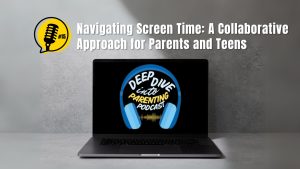We spend a lot of time talking about how children should act online; digital citizenship or online etiquette. Over the last few years, the need to teach children about appropriate online behavior has fallen on the schools. Thankfully, many schools have started a digital citizenship program. Parents have a part in this, and a responsibility to their children, and every other parent’s children that show up in their child’s social media posts.
In my book Parenting in a Digital World, and in my cyber safety seminars, I show parents the various threats our children face online. The greatest threats often appear when our children use public or open social networks. A public network allows anyone access to whatever your child is posting online. Parents must know about every online social media account their children have, and if it is public or private. A private account will block strangers from accessing your child’s posts, which include videos, pictures, and their personal information.
This leads me to the central problem with most children who use social media. They want to share their images, videos, and ideas with as many people as possible. They want a lot of “likes.” The social media site, like Musical.ly, is literally begging them to share their musical creations with everyone. Here is where theory and personal experience collide.
Last week, my wife asked me if I knew about this social media app, Musical.ly, that our neighbor kid, Daren, is using. I said, “Yes, in fact I just wrote a blog post about it (read it here). It’s fine as long as it is private.” My wife replies, “Well, your 12-year-old son, Zach, is in his videos, you may want to look into it.”
I stepped into the garage and as usual, I saw Zach and Darin playing Mindcraft on the Xbox. I asked Darin if he was making music videos with Zach on Musical.ly. Darin said, “Yes.” I asked him if his account was public or private. He replied, “Public.” “Why,” I asked. “Because you get more likes if it’s public.” I sighed. I asked him to not film Zach if it was public because I didn’t want strangers to watch them online. He politely said, “Sure, no problem.”
Later, Zach and I talked about the situation. Zach is twelve. He is not old enough to have a social media account. I told him I did not want him his image/video posted on a public social network. We talked about the dangers, and he agreed.
I contacted Darin’s dad, and told him what I learned. He appreciated the “heads up,” and p"romised to look into it.
If you allow your child to have a social media app, what is your responsibility, not just to your child, but everyone else’s? Many parents who diligently block inappropriate content from their child’s devices are thwarted by their child’s friend who has no barriers or online restrictions. Unfortunately, we are fighting an uphill battle. Harris Interactive polled teens and asked them if their parent has talked to them about how they should use the internet. 80% reported, no.
Here are some parent etiquette guidelines that I recommend for your family:
- Review every app your child has on their device. Is it appropriate for them to have it?
- Confirm every social media account your child has is set to “private.”
- Tell your child to only post images/videos of children after their parent says it is okay.
- Don’t comment on your child’s wall/feed. If you see something that is concerning, talk to them off-line and then remedy the problem.
- Don’t tag your kids in embarrassing photos. Actually, don’t upload those pictures at all. Scrutinize every picture and decide whether your kid would be okay with it being online permanently – yes, pictures stay online forever!






